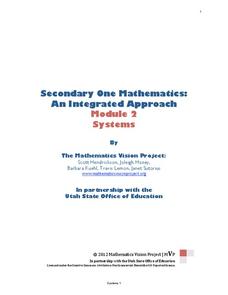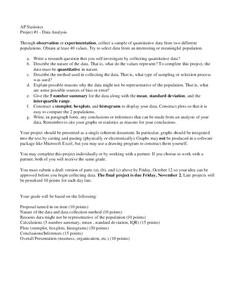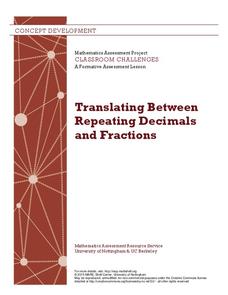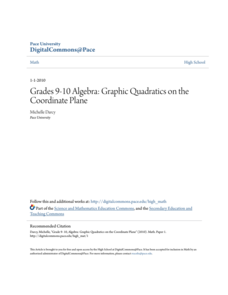Illustrative Mathematics
Buying Protein Bars and Magazines
Packing for a trip? This activity allows learners to decide how many magazines and protein bars they can buy with twenty dollars. They can organize their work in a chart to track how many items they can purchase. There are two different...
Curated OER
Find 1
Extend your class's ability to represent unit fractions on a number line with this challenging worksheet. Given two number lines, one labeled with zero and 1/4, the other with zero and 5/3, learners must accurately locate the number one...
Curated OER
Symmetries of a Quadrilateral II
Learners investigate the symmetries of a convex quadrilateral in a collaborative activity. Rigid motion and complements are explored as learners analyze different cases of reflections across a line.
National Security Agency
Classifying Triangles
Building on young mathematicians' prior knowledge of three-sided shapes, this lesson series explores the defining characteristics of different types of triangles. Starting with a shared reading of the children's book The Greedy...
Mathematics Vision Project
Module 2: Systems of Equations and Inequalities
The brother-sister pair Carlos and Clarita need your class's help in developing their new pet sitting business. Through a variety of scenarios and concerns presented to the siblings, the learners thoroughly explore systems of equations...
Fort Bend Independent School District
Data Analysis - AP Statistics
What better way to study survey design than to design your own survey! Bring a versatile data analysis project to your AP Statistics class, and encourage them to apply the practices from their instructions to a real-world survey...
Achieve
Corn and Oats
How much land does a parcel hold? How much fertilizer does it take for a field of corn? Pupils answer these questions and more as they apply ratio reasoning and unit analysis.
Mathematics Assessment Project
Classifying Proportion and Non-Proportion Situations
Proportions, proportions, everywhere. Class members complete an assessment task solving problems involving proportionality. They then complete an activity classifying given situations as proportional or non-proportional.
Mathematics Assessment Project
Comparing Lines and Linear Equations
Scholars first complete an assessment task on writing linear equations to model and solve a problem on a running race. They then take part in a card matching activity where they match equations and graphs of lines to diagrams of fluid...
Mathematics Assessment Project
Translating Between Repeating Decimals and Fractions
Model for your young mathematicians the process for converting repeating decimals to fractions. To demonstrate their understanding of the process, class members then complete and assessment task and participate in an activity matching...
Bowland
My Music
Scholars investigate how the tempo of music affects heartbeats. Groups develop hypotheses about music and its connection to heartbeats before carrying out an experiment. They analyze and present data from their investigations.
California Mathematics Project
Model Solar System
The sun's diameter is 864,337 miles—challenge learners to create a scale model of the solar system that fits in your classroom. Scholars make conversions and work with scientific notation as they create the scale model.
Radford University
Parallel Lines, Transversals, and Angles: What’s the Connection?
Streets, bridges, and intersections, oh my! Parallel lines and transversals are a present in the world around us. Learners begin by discovering the relationship of the angles formed by parallel lines and a transversal. They then...
Mathed Up!
Tree Diagrams
Explore how to visually represent probability problems. Scholars watch a video to refresh their memories on tree diagrams. To finish the activity, they complete a worksheet of questions on this topic.
PBL Pathways
Total Cost to Produce the Turbo Blender
Class members blend their knowledge of functions and problem-solving skills to provide business advice to the Turbo Blender manufacturers. Through a project-based approach, learners examine marginal cost data to produce a function....
K20 LEARN
You’re The Network: Data Analysis
How do you rate? Young scholars use graphical data to analyze ratings of different television episodes. Their analyses include best-fit lines, mean, median, mode, and range.
101 Questions
Dueling Discounts
What a bargain—an informative, free resource! Given prices of several objects, learners determine whether 20 percent off or $20 off would be a better bargain. They use the results to come up with a generalization of the situation.
101 Questions
Bubble Wrap
Let your lesson pop by using the resource. After watching a video of a man popping a square piece of bubble wrap, young mathematicians determine the time it would take to pop other pieces of bubble wrap with given dimensions. The...
5280 Math
Multiplication Table Algebra
Patterns, patterns, everywhere! Young scholars examine the multiplication table to identify patterns. Their exploration leads to an understanding of the difference of squares and sum of cubes by the completion of the algebra project.
Pace University
Grades 9-10 Algebra: Graphic Quadratics on the Coordinate Plane
Find quadratics in the world. Learners select ways to compare and contrast linear and quadratic functions and how to demonstrate knowledge of parabolas in the world. Teachers assign a third task challenging individuals to find equations...
Radford University
How Normal Are You?
It's completely normal to learn about normal distributions. An engaging lesson has young statisticians collect and analyze data about their classmates as well as players on the school's football team. They determine whether each set of...
Radford University
Tiling
What more could we want from floor tiles? Using pattern blocks and graph paper, pupils determine ways to completely tile a floor of given dimensions. They consider the aesthetic quality of the tiles by creating a tessellation and...
Radford University
AFDA Probability and Law of Large Numbers
The more trials scholars perform, the closer they'll likely be to the true value. After designing a probability experiment, young mathematicians conduct the experiment for five different numbers of trials. They then analyze the results,...
Discovery Education
Sonar & Echolocation
A well-designed, comprehensive, and attractive slide show supports direct instruction on how sonar and echolocation work. Contained within the slides are links to interactive websites and instructions for using apps on a mobile device to...

























